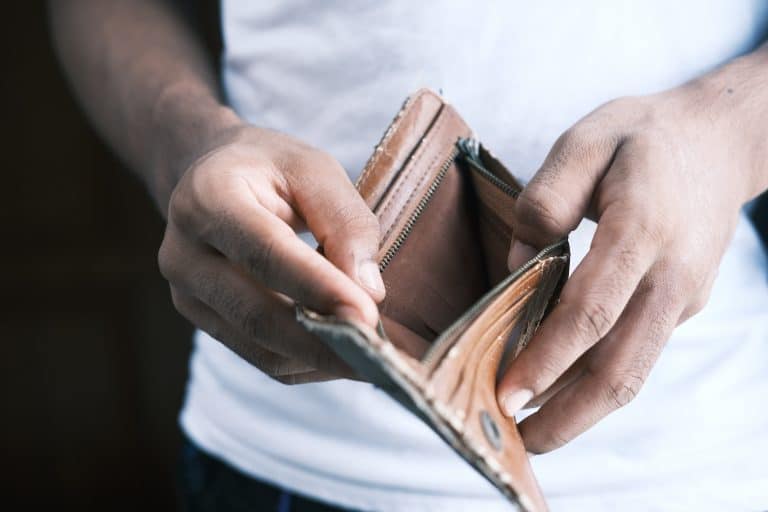I need help managing my money (12 tips on how to manage money when you’re broke)
I need help managing my money!
Money is a touchy subject for many people. It’s not something we like to talk about or think about, but it’s also not something we can avoid.
Money and income control how much of the world you get to experience and what kind of life you live.
If you struggle to make ends meet, it can be tough to manage your money.
If you’re currently in a position where your money isn’t going very far, then this article will be your saving grace! Here are 12 tips for managing money when you’re broke:

How do you manage money when you are broke?
One of the best ways to get your money under control is by creating a tracking sheet or using a tracking app.
If you are using a banking app, it takes a bit of admin time to set up the categories etc., but from then on, it’s all done for you.
Now you can see exactly what is going on – this is the first key to managing money when you are broke.
The second big step is to take yourself out of as many decisions as you can.
You do this by automating as much of your money as you can.
Set up automatic payments for all the bills you can.
This should help with some of the admin burdens and reduce your decision fatigue.
Finally, make sure that you are also paying yourself first. It’s a little trick but amazing at starting to pull yourself out of being broke.
Pay yourself first!
Make sure you cover all your bills but make sure the first person that gets paid is you – into a savings account.
It doesn’t matter how small it is initially, just that you are starting to save first and then spend what’s left.
It could be a number or a percentage just starting making that first payment to yourself.
Who can help manage my money?
- Do it yourself
The first person that can make the biggest impact on your finances is YOU!
YOU are the first and most important key to moving away from being broke to being awesome at money.
We can often be our own worst enemy when it comes to money – not tracking, not budgeting and spending far more than we earn on stuff we don’t need.
Unsubscribe from all the adverts tempting your money away from you and become your own chief financial officer.
- Have someone help you
Working with a financial planner or coach can help give you the guidance and education you need to make well-informed choices about your finances.
Understanding the advantages and disadvantages of different methods will help you make better decisions given your circumstances.
A good financial planner or coach can also help you put things into perspective and think longer term on goals in every area of your life, not just your bank balance.
It’s important to get your money sorted but not forget that your money is a tool to achieve what you want most in life.
Use your money to achieve great things, not just more zeros in the bank.
- Get someone to do it for you
If or when things get more complicated, you might want to seek financial advice and have someone do more things for you.
However, this is unlikely to be an option if you are broke.
Most financial advisors require you to have wealth to work with them, often at least 100k inaccessible assets.
Usually, you would go to a financial advisor when you have expensive questions.
How can I get my money under control? 12 tips how to manage your money when you’re broke
If you’re struggling to manage your money, don’t worry – you’re not alone.
In fact, there are a lot of people in the same situation.
The good news is that some simple tips and tricks can help get your finances back on track. Here are nine tips for managing your money when you’re broke:
When you’re broke, the last thing you want to do is worry about money.
But, if you want to get your finances under control, there are a few simple tips that can help. Here are 12 tips for managing your money when you’re broke:
Tip 1: Set yourself some goals. Figure out what you need and want in life and set some goals for yourself.
Write down your goals and put them somewhere you’ll see every day, like on the fridge or in a journal.
Then, figure out how much money you need to save each day/week/month to meet those goals.
Tip 2: Pay yourself first. Save up an emergency fund that is equivalent to three months’ worth of living expenses, and then put the rest into a savings account.
Try to save at least ten per cent or more of your income – if you can’t do this right away, start small by saving one per cent every month until you get there.
Tip 3: Live within your means. Don’t spend money on things that aren’t in your budget (like eating out every night or buying new shoes).
Make sure that your monthly spending stays within the limits of what you make.
Tip 4: Budget every penny. One of the best ways to start managing your money is to get very clear on your own numbers.
Gather your data to know what is coming in and going out. Knowing your numbers will be the start of taking back control of your finances.
From there, you can begin to create a budget that works for you and start saving for
The 50 30 20 rule is a great starting point to manage your finances. The basic idea of this rule is that you should spend 50% on needs, 30% on wants and put the last 20% towards savings/investing.
Of course, this is a general guideline, and you may need to adjust these percentages depending on your specific situation.
But it is starting to give you guidelines for your budget and will get you thinking about what is important to you.
Keep track of how much money you’re bringing in and where it all goes by creating a budget with specific categories for each expense (like rent, groceries, utilities etc.).
Once everything is planned out, you’ll know where every penny goes and how much money is leftover.
Tip 5: Consider needs vs wants. Needs are things that keep your life going (like rent or a car payment), while wants are nice-to-haves, like eating out at restaurants or shopping for new clothes.
If you can delay buying a want, try to save up a little bit of money before going out and buying it.
Tip 6: Create an emergency fund. Everyone needs an emergency fund – it’s a cushion if something happens and you need money right away (like your car breaking down or needing to go to the doctor).
An emergency fund is like having three months of living expenses set aside when things get rough.
Tip 7: Haggle for better prices. Don’t be afraid to ask for a better price if you’re shopping around. The store will often give you a discount if you ask (or even if you don’t).
Tip 8: Shop around. Don’t just go to one store when you need something – shop around and compare prices at different places.
You might be surprised at how much money you can save by doing this.
Tip 9: Figure out what is your freedom number. You might be thinking, But Im broke. Why would I need to know this now?
The answer is that it will tell you your ultimate target, and now you can track your way to it.
Your freedom number is the amount of money you need to have to live comfortably and not worry about money.
This number will be different for everyone, but it’s a good idea to know what it is so you can work towards achieving it.
Tip 10: Figure out your net worth. Your net worth is how much money you have, i.e., the total value of all your assets minus all your debts/liabilities.
To figure this out, add up everything you own (bank account balances, house’s market value, etc.) and subtract any debt with an interest rate (like your car loan or student loans).
Tip 11: Don’t forget your debt. Debt can be a significant burden, so it’s important to stay on top of your debt and pay it off as soon as possible.
If you have student loans or credit card debt with a high-interest rate attached, try making extra payments towards the principal every month until the balance is paid off completely.
Tip 12: Automate your finances. Set up your savings and payments to happen automatically without you needing to get involved.
This makes sure that your bills get paid on time, you save every month, and most importantly, you don’t get in your own way.
Conclusion: I need help managing my money: 12 tips to manage your money when you’re broke
Now that you know some simple money management tips, it’s time to get your finances under control!
Start by creating a budget and sticking to it.
Make sure you save, spend and invest your money wisely.
And above all, remember to live within your means.
If you keep your debt under control and automate your finances, you’ll be on your way to financial freedom!
Thanks for reading.
If you would like any help with your money, click below.







